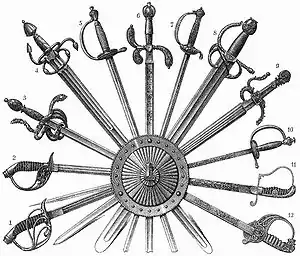Almace
In the legendary Song of Roland, Almace, Almice or Almacia is the sword of Turpin, Archbishop of Reims, one of the last three Franks to die at the Battle of Roncevaux Pass, along with Roland (Orlando in Italian) and Gualter de Hum.
Unlike Roland's much more famous sword Durendal, very little is said about Almace in the Song of Roland. However the Norse saga, the Karlamagnus saga expands this slightly,[1] claiming that a sword called Kurt (better known as the Curtana), Almace and Durendal were three swords forged by the legendary Anglo-Saxon blacksmith Weyland, and presented to Charlemagne. Charlemagne tested the swords by seeing how far they would cut into a steel mound; Kurt penetrated "a hand's breadth" but was notched, Almace penetrated a hand's breadth without damage, and Durendal penetrated "half the length of a man's foot". Charlemagne gave Kurt to Ogier the Dane and Almace to Bishop Turpin, and initially kept Durendal for himself. (Later he was told in a dream to give Durendal to Count Roland.)
Another legend,[2] written about Curtana itself, claims that it, Durendal, and Charlemagne's Joyeuse are a set of three, leaving Almace's origins unexplained.
The etymology of the name is uncertain, but it may be derived from Arabic,[3] or from the Old Norse almusa, meaning alms.
References
- "karl's swords". brown.edu. Archived from the original on 2 Aug 2009.
- Bullfinch's Mythology, "Legends of Charlemagne," Chapter 24
- Sayers, Dorothy L., translator (1957). The Song of Roland. Hammondsworth, Middlesex, England: Penguin Books. p. 38. ISBN 0-14-044075-5.

